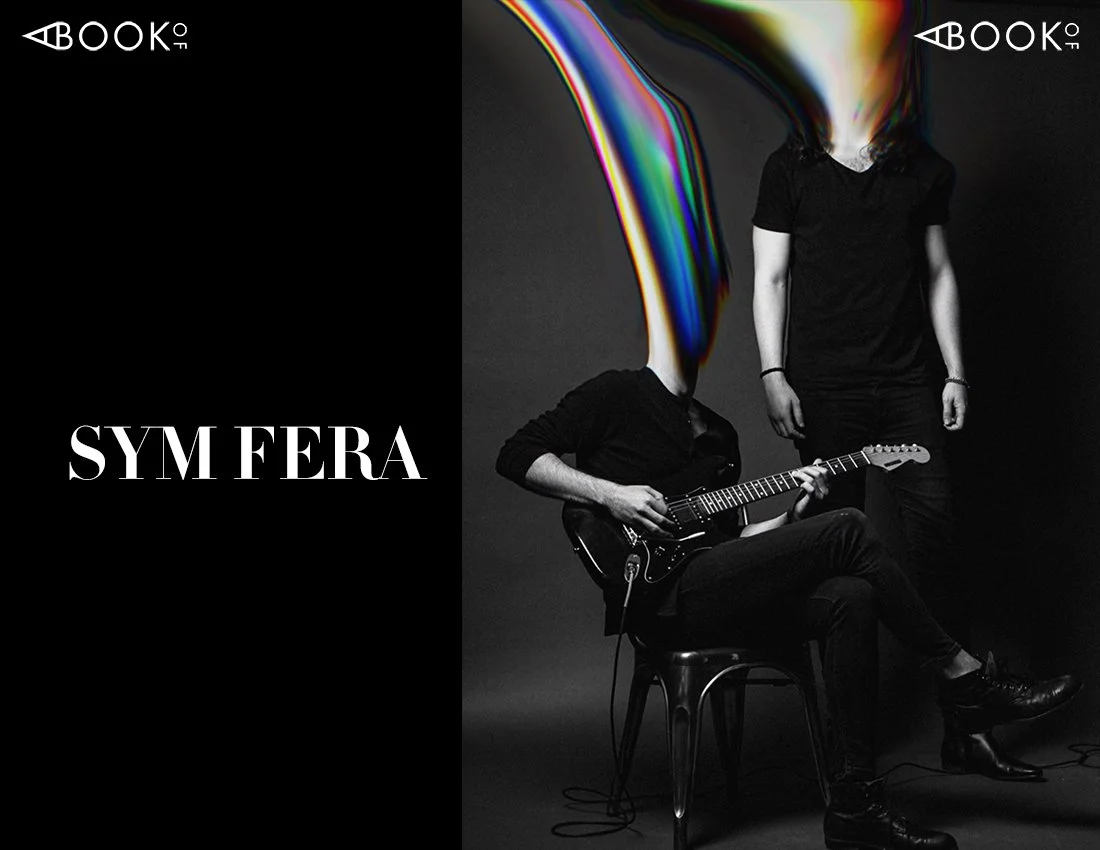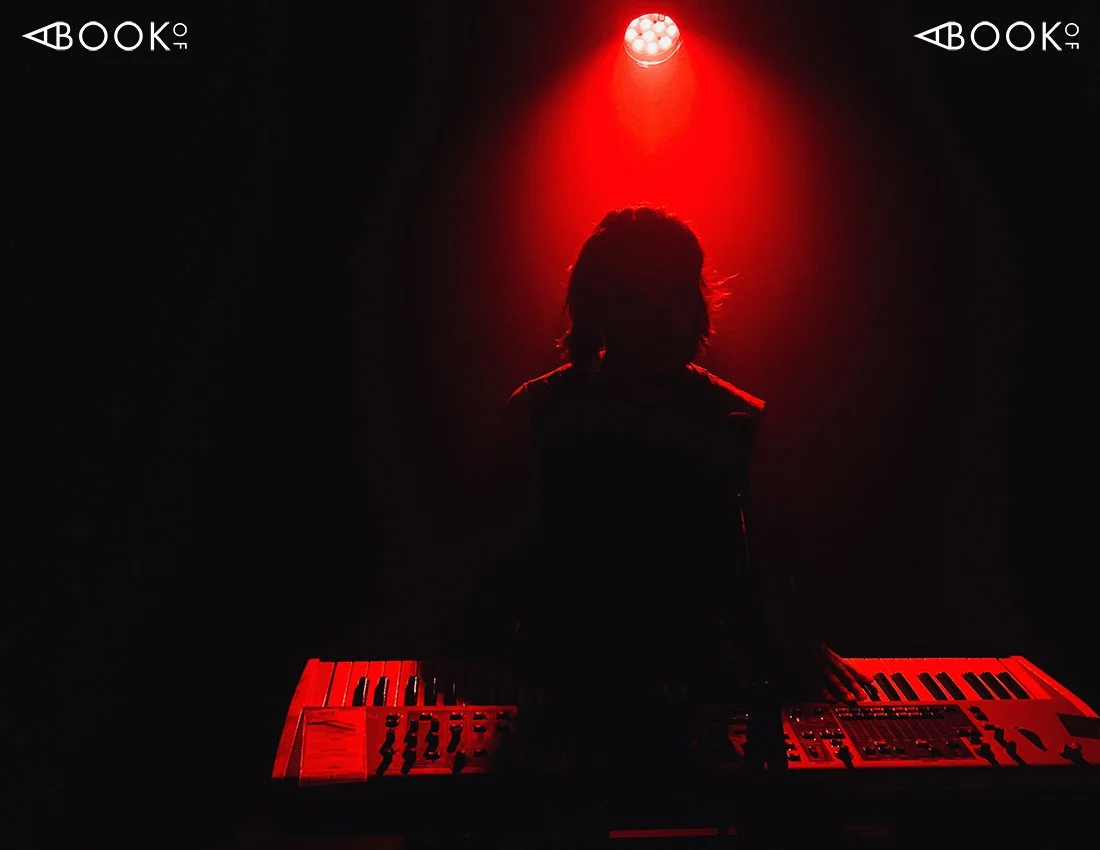SYM FERA
In the effervescent world of music where anonymity often shrouds in mystery, SYM FERA has charted an unconventional course, cloaked in the shadows while their melodies traversed the globe. As they stand on the brink of unveiling their true selves, there’s a palpable excitement mixed with a tinge of curiosity—how will this revelation morph their bond with fans and the essence of their sound? Yet, their hope is simple: to let their unveiling be a mere anecdote that beckons more ears to their artistry, keeping the core of their musical journey intact. The genesis of SYM FERA wasn't rooted in a quest for fame or a strategic ploy for intrigue; it was the pure desire to let their music—stripped of any preconceived notions—speak the loudest. From the enigmatic beats of "11/8" finding a home in the heart of 'Ozark' to their deliberate eschewal of digital omnipresence for genuine musical communion, their journey is a testament to the art of music itself. As they reflect on their path, one adorned with the challenge of anonymity and the lure of authentic creation, SYM FERA stands at a pivotal juncture, not just unveiling identities but also unfolding a new chapter where their music continues to be the beacon that guides them through the ever-evolving landscape of sound and humanity.
Starting from a place of anonymity, you've navigated the music industry in a rather unconventional way. As you prepare to reveal your identities, how do you anticipate this change will impact your relationship with your audience and the interpretation of your music?
I hope all it does is let a wider audience see and hear our work. Beyond that, I hope it doesn’t change anyone’s experience of it. We’ve really enjoyed the way people have been consuming the music, and that was the whole point. So, I hope our identities are just a fun fact that maybe let more people hear it, and then everyone immediately just resumes focusing on the stuff itself.
The choice to remain anonymous until now has been a significant part of your story. Can you share more about the moment you both decided that this was the right path for Sym Fera, especially considering the potential risks and rewards?
I think we’ve said this ad nauseam in public, but we never intended it to be a significant part of our story. We just wanted the music to be the most significant part, and we didn’t want any of our public personas or connections to influence how people heard the music. In different ways, my partner and I both have a public footprint that’s out there (hell, everyone does nowadays) and that would probably influence what people expected of us. Inconveniently, we wanted to make music that was wholly different from that footprint. So we decided not telling anybody our names was the best way to laser-focus on the only thing people had access to: the music itself.
Your single "11/8" has not only garnered significant streams but was also featured in the television series Ozark. How did this opportunity come about, and what was your initial reaction when you learned your music would be part of the show?
Significant is relative in the streaming space; the numbers don’t mean the same thing as when physical records were being sold, so that’s a caveat. But it came about through a sync agency just hard-pitching us without telling anyone anything about us, at our request. We knew we wanted to score things (we’ve both discovered some of our favorite artists simply because they were featured in a show), but it’s tricky trying to network with music supervisors without telling them your name. But I guess our path has been us doing it the hard way, or the unwise way, and getting lucky. So we got extremely lucky that a few shows, including Ozark, liked our song enough to feature it prominently over big scenes. And we’re pretty proud that they still don’t know who we are, and didn’t care - they liked the song, that was that.
In the creation of your music, including the recent remix package for "11/8", what is your collaborative process like? How do you blend your individual influences and ideas into a cohesive sound that is distinctly Sym Fera?
That song was just a challenge to get us out of the box. One of us chose a random time signature that was pretty atypical (in this case, 11/8), and we just wanted to see if we could make a song that was nonetheless listenable and memorable, without succumbing to the old four on the floor grid. So that member sent the other a very sparse, bare-bones demo of the vocals and the general chords, just held, and the second member had to produce around that skeleton.
The division of labor is often member 1 does lyric and melody, member 2 does chords and production and instrumentation. But there are of course exceptions, sometimes one of us writes the whole damn thing, and the other just sprinkles on top. And, honestly, we prefer to write remotely at first. We get in the room together when the chord progression and melody is pretty much settled. We’re both kind of shy that way.
The decision to collect cell phones at your Lodge room performance in LA was quite bold. Reflecting on that experience, what did you learn about your fans and their willingness to engage with your music in such a raw and unmediated form?
Again, that was another thing we did that was probably ‘unwise’ if your goal is to promote your music project far and wide, but it still felt right to us. Yes, we missed out on people filming the show on their phones, and promoting us on social media (which we’ve heavily neglected).
But in exchange for that sacrifice, we got to watch the magic of an audience being purely present, totally in the moment. It was really unforgettable. We surrounded them with audio-reactive lighting, gave them chairs to sit in facing the stage. A captive audience, cut off from the world’s chaos for just a couple hours, made to share in a curated hallucination. It was beautiful.
Your music has been described as a mix of atmospheric electronic rock with an apocalyptic and dystopian feel. How do you achieve this specific sound, and what tools or techniques are essential in
your production process?
Well the lyrics are definitely dystopian that’s for sure. I’m not sure why I can’t write a simple love song without throwing in some sort of Cormac McCarthy or Blade Runner vibe on top of it, but I guess that’s just what strikes me as interesting. I love the apocalypse. Everything changes when mapped onto the end of the world.
In terms of sonics, we like to play in opposites a lot. Whenever a song is purely electronic, we throw in a 100-year-old piano we found at a flea market and refuse to tune it, or some sort of tactile percussion from keys or a wood floor or something. I guess we can’t seem to pick a lane. And likewise, whenever something is pure analog and acoustic, we like to throw a little Prophet or Moog over it just because. My partner is the master of analog toys, he’s a bit of a hoarder. And we can’t seem to commit to one lane or the other, so the sound has to be a hybrid.
The theme of social media's impact on humanity is a recurring element in your work. Beyond the lyrics, how do you think the digital age has influenced the way music is created, shared, and experienced?
I think it’s influenced everything about us, music is just a small footnote in what this worldwide hive mind has done to us. We all thought letting everyone talk at once in one giant hivemind would cause the best ideas to rise to the top through a darwinian, free market process, but it turns out the ideas that survive collision with other ideas are not necessarily the best ones, or the right ones, but the ones that spread easiest like an infectious disease. And those ideas, it turns out, are examples of human nature at its worst, its most capricious, its most animalistic and tribal and inflammatory. So, now we’re at a crossroads, because the only options we have in this world are conversations or conflict. And there’s no unringing that bell - the worldwide digital brain is here to stay, and we are all its neurons, and it is showing signs of mental illness.
Streaming is a mixed bag in my opinion - there’s all the obvious complaints about artists being fairly compensated, and about certain tech companies controlling who gets heard and discovered and who doesn’t in an artistic space.
But the silver lining I’ve found in the streaming age is that this whole cliquey, genre-loyalty-gatekeeping thing has kind of gone away. Kids and twenty-somethings all listen to an eclectic mix of musical genres instead of defining themselves by one, and the artists have responded by crossing genre borders themselves that were previously heavily guarded in the 90s. There’s no taboo about someone’s car playlist going from Chopin to Billie Eilish to Childish Gambino to Badfinger to Tom Waits and back around again, and I think that’s great. Those boundaries were no fun in the first place, and they prevented a lot of discovery and innovation when I was a kid.
With the release of your new single 'Beg', you're working with animator Josh Shaffner. What inspired this collaboration, and how does visual art contribute to the storytelling of your music?
Josh was recommended by a mutual friend in the Beehive collective in LA, and one look at the animations he just does for fun show’s what a powerhouse he is. We gave him totally free reign - we sent him song and lyric, and said, ‘make whatever you will out of this.’ Usually we approach music videos with a pretty hard general concept in mind. This time, we wanted him to just go wild with it. He did not disappoint.
Looking back at the inception of Sym Fera, did you ever anticipate the level of success and intrigue you've achieved without leveraging industry connections or social media clout?
We never expected anything. We did this for our own pleasure and our own artistic selfish urges. We wanted to make something we would listen to if we found it, and that we’d feel proud of. Beyond that, no expectations whatsoever. So far it’s been very gratifying that the people we’ve reached seem to like it, and have taken it the way we intended it.
Many artists struggle with the balance between personal privacy and public exposure. Having chosen a path of anonymity, what have been the most challenging and rewarding aspects of this journey for you both personally and professionally?
I think it’s the obvious - it’s been challenging to get the thing we made out there to as many people as we’d like. But it’s been incredibly rewarding whenever people do encounter it because they’ve told us it made them feel something. And that’s a compliment that can’t be understated; it really is the whole point. When a stranger tells you something you made caused them to feel something, you float through the rest of your day in a way that an accolade or a sync or a number on a streaming service just doesn’t compare to.
Your music often delves into themes of existential dread and introspection. Can you discuss how personal experiences or philosophical influences shape your songwriting process?
I think those themes would have been the purview of angsty goth sub-genres in previous decades, but now unfortunately I think most people, young and old, have these thoughts and feel this way about the world. When every conspiracy seems to contain a kernel of truth, when every authority figure and hero is revealed to be a secret monster, when no source can be trusted to tell you the whole truth about anything, how could we feel anything but dread?
As artists who have navigated the LA music scene from a unique vantage point, what advice would you give to emerging musicians about maintaining authenticity in an industry often criticized for its superficiality?
I don’t think we’re in any position to give anyone career advice. The only advice I feel comfortable giving is more creative advice, based on our limited experience. The truth is I would have felt satisfied with what we made regardless of how many people heard it or liked it, because we made what we really wanted to make. So if your goal is that sort of satisfaction, then ignore all the ‘good advice’ and just vomit your guts into your instrument and see what sounds come out.
If your goal is to make millions of dollars and be adored worldwide, we really can’t help you there. Let us know if you figure that one out. We’re not so deeply pretentious that more success isn’t a goal of ours, of course it is. We’re just not willing to alter the material to that end, and we like doing things our own way. Maybe we’d reach a wider audience if we were more bendable, who knows. But failure is a possibility either way, so you might as well make stuff you actually like. Any success after that can be a bonus.
The concept of a "social experiment" is fascinating within the context of your career. Looking forward, how do you see Sym Fera evolving once the experiment's current phase—remaining anonymous—is
concluded?
We hope we can keep the character of the thing we made and just expand the amount of eyeballs and ears on it. We feel like the project has its own identity now, and I don’t think that identity will be erased simply by revealing ours. So, as far as how we feel goes, the experiment was a success and now we’re just ready to see how far this thing can go without that hand tied behind our backs.
Reflecting on the early days of Sym Fera, can you share a pivotal moment or decision that you feel significantly propelled the project forward, perhaps in a way you didn't initially anticipate?
I think it was when we decided we only needed two members, and that we didn’t need to stick to one genre. My partner and I had been jamming with various other guys (who were all great) in rock bands, blues bands, all sorts of bands. And as the tools available to everyone became more high tech, we realized we could do everything ourselves, instead of trying to teach other people what our esoteric creative goals were and having them approximate it. This is another silver lining of the digital age - everyone has access to an infinite library of instruments and sounds, now, and you can make anything you want very easily without having to ask other people for help. And once we realized that, we went from being in a sort of typical “alt rock” band to getting weirder, challenging each other and pushing each other’s boundaries. Maybe it was too many cooks in the kitchen, maybe we just needed to feel like we weren’t being watched to branch out into our stranger interests. But that was the turning point. We got signed shortly after that decision to our first label, and things progressed from there.
If you were a book, what book would you be and why?
American Gods. Other than the fact that it’s probably in my top three favorite novels, the concept of ancient, earthy gods clashing and interacting with the cold digital gods of the future strikes me as what’s going on in my head, the world, and in what kind of music we’re trying to make. Even though the tech has changed since the book was published, the overall themes and imagery remain relevant.
Finally, with the revelation of your identities on the horizon, what are your hopes for the future of Sym Fera, both in terms of your music and your impact on the music industry at large?
It’s a crowded space, so we hope we find a nook where more people hear it, and we hope it makes them feel something. Even if they hate us. The opposite of love is apathy, not hate, right? So if you hate our guts, hey, at least we made you feel something.
LISTEN TO SYM FERA’S SINGLE BEG:
APPLE MUSIC | SPOTIFY | ITUNES


















